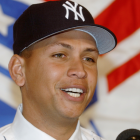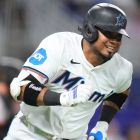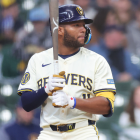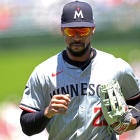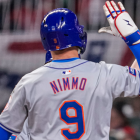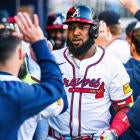
Two-way superduperstar and SEO colossus Shohei Ohtani is, as you're surely aware, the main character of the 2023-24 offseason in Major League Baseball. That's because he's a free agent, and – assuming he doesn't opt for a short-term deal that allows him to re-enter the market soon – he's going to sign the largest contract in MLB history. That's the case even though he will be "just" one of the best power hitters in baseball in 2024 and, thanks to his recent elbow procedure, not resume his ace status on the mound until 2025.
The backdrop to all of this is that Ohtani was just recently crowned American League MVP for the second time in his singular career. That puts him in the unusual position of (almost certainly) changing teams as the reigning MVP. While it's theoretically possible that Ohtani re-ups with the Angels, that seems highly unlikely. If indeed he does sign with, oh, the Dodgers or Rangers or Mets or Red Sox or some other lucky squadron, then Ohtani will become just the fourth reigning MVP ever to switch teams, whether by free agency or trade. That historically rare set of circumstances gives us the opportunity to look back at the other four reigning MVPs who found their way to new teams, whose ranks Ohtani will presumably soon join. Let's do that now.
Eddie Collins, Athletics to White Sox, 1914
Via: Trade
When the future star second baseman won the AL's top individual honor as a member of the 1914 Philadelphia Athletics, it was known as the Chalmers Award. Collins that year batted .344/.452/.452 with 14 triples and 58 stolen bases, and his team won 99 games and the pennant before being swept by the Boston Braves in the World Series.
Given that Collins was just 27 at the time, he wasn't the kind of player you trade. Even so, Athletics boss Connie Mack did so as part of a drastic retrenchment prompted by the outbreak of the Great War in Europe and the rise of the nascent Federal League as a competitor to Major League Baseball. Mack refused to negotiate a new contract with Home Run Baker, cut loose Jack Coombs, and let Herb Pennock and Charles Bender jump to the Federal League. He also sold Collins and his freshly earned Chalmers Award to the White Sox for the reported sum of $50,000. Over the next 12 seasons, Collins with Chicago would pile up a WAR of 66.8 and cement his status as a future Hall of Famer.
Barry Bonds, Pirates to Giants, 1992
Via: Free agency
Although the story seems to have become exaggerated a bit over the years, Bonds was indeed almost – or at least some level of "almost" – traded to the Braves in the spring of 1992 before he became a free agent. To hear Atlanta's Hall of Fame GM John Schuerholz tell it years later, the club had every intention of signing Bonds to an extension after acquiring him. That raises the interesting possibility that the Braves, after paying the going rates for a Bonds extension, might not have signed Greg Maddux as a free agent that following winter. In the end, though, the Pirates didn't trade him, and he entered free agency as a 28-year-old reigning MVP.
He landed with his hometown San Francisco Giants in December of 1992 – the day before Maddux inked with Atlanta – on a six-year, $43.75 million contract. While those terms look exceedingly modest these days, it was at the time the priciest deal in MLB history. To say the least, the Giants' investment was a sage one, as Bonds won an MVP in his first season by the Bay and had a WAR of almost 50 across that first contract with the Giants. Even better things would be ahead for the pairing.
Until Ohtani makes his decision, Bonds will continue standing as the only reigning MVP to change teams as a free agent.
Alex Rodriguez, Rangers to Yankees, 2003
Via: Trade
After becoming a free agent at the conclusion of the 2000 season, A-Rod wound up signing what at the time was the largest player contract in the annals of professional sports – a 10-year, $252 million pact with the Texas Rangers. While Rodriguez more than delivered in his early seasons with the Rangers, the team met with little on-field success, which in turn led to the (entirely flawed) perception that A-Rod was somehow an organizational millstone.
After the 2003 season, for which A-Rod won the AL MVP along with a Gold Glove and a Silver Slugger, the Rangers began shopping him and his remaining salary obligations. For a time, it appeared Rodriguez would land with the Red Sox, but the deal fell apart at the last instant when the players union objected to what would have been a fairly drastic restructuring of his contract. That allowed the Yankees to swoop in and complete a blockbuster swap for A-Rod – one that sent Alfonso Soriano and Joaquin Arias as a player to be named later for the reigning MVP. Texas also ponied up for $67 million toward Rodriguez's remaining salary obligations.
Rodriguez switched to third base in tacit deference to shortstop Derek Jeter and wound up winning a pair of MVPs and a World Series on the Yankees' watch. After winning his third and final MVP in 2007, A-Rod opted out of his contract and became a free agent, and it looked for time like he'd be the first-ever reigning MVP to switch teams twice. However, the Yankees followed him into the market and were able to re-up with him for the remainder of his career.
Giancarlo Stanton, Marlins to Yankees, 2017
Via: Trade
In his prime, Stanton was among the most jaw-dropping power hitters ever glimpsed thanks to his imposing physicality at the plate and his top-of-scale exit velocities. It all came together like never before or since in 2017 when, as a member of the Marlins, he amassed 59 home runs and earned NL MVP honors over Joey Votto of the Reds in one of the closest ever votes.
After that campaign, Stanton was three years into the 13-year, $325 million extension he'd signed with the Marlins. Under new ownership and publicly fronted by CEO Derek Jeter, the Marlins were looking to shed those obligations. They had deals in place with the Giants and then the Cardinals, but Stanton invoked his no-trade clause to block both of them. He did, however, approve a trade with the Yankees, which went through less than a month after Stanton was awarded the MVP. In addition to one of the best power hitters in baseball, the Yankees also received $30 million, while the Marlins received for Starlin Castro, José Devers, and Jorge Guzmán. While Stanton has battled injuries with New York, he's thrived overall on a rate basis and has a 38-homer season to his credit since the trade.
Now it's your turn, Mr. Ohtani.













